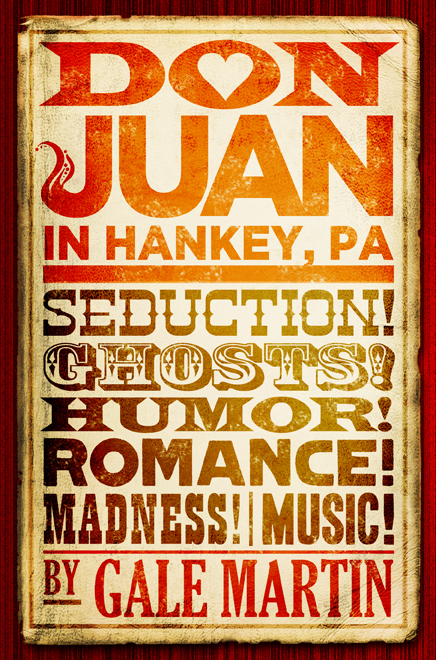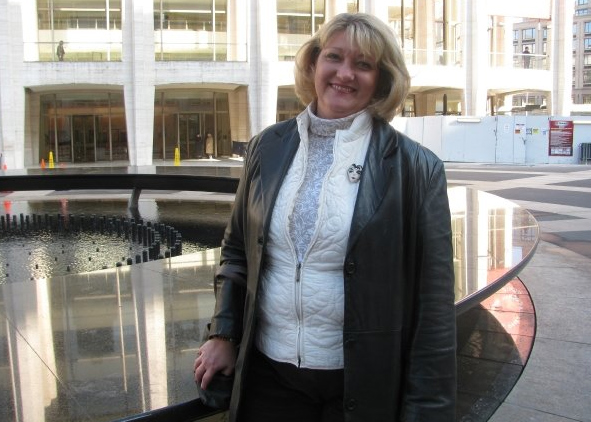
One of my favourite pieces of writing advice comes from Raymond Chandler: “When in doubt, have a man come through a door with a gun in his hand.” In a similarly succinct vein there’s what’s evolved as the first unwritten rule of Nanowrimo: “If all else fails, have ninjas burst through the wall and attack someone.” To these we should perhaps now add Gale Martin’s rule of opera-based novels: “If a work of fiction contains homage to classic opera, you can pretty much bank on some sort of supernatural influence… Either that, or a fat blonde in braids and a horned helmet.” A prolific churner of words in the blogosphere and elsewhere, Gale is in the middle of a helter-skelter blogging tour to promote her novel Don Juan in Hankey, PA, which tells the story of a small-town operatic society’s endeavours to put on Mozart’s classic opera in Pennsylvania. At once a slick farce and a homage to amateur dramatics, it juggles the sublime and the ridiculous at a pace that never drops below allegro. I caught up with Gale on her blogathon just long enough to hurl a few questions her way:
You started writing relatively late. What was your motivation?
I began writing in my 40s though I had been an English major in college and a lifelong reader. I think writing creatively is more than anything a matter of readiness. I wrote marketing and communications stuff for a living for a couple years, so I learned how to churn out copy. As silly as this sounds, one of my good friends from high school had a niece who published a bestseller. At the time, I didn’t really know any published writers of mainstream fiction. I thought if she can do it, so can I. I had a story to tell so I began writing a novel. It wasn’t very good, but it was instructive, like learning to play the violin in public.
Was it hard to get a novel about opera published? Why do you think it’s not an attractive subject for fiction, given that the two share so much source material?
Honestly, this book is about love and sex and longing and rejection—all universal feelings and emotions. It just happens to use classic opera as a backdrop. That being said, it was definitely hard to get an agent’s attention. Let me rephrase that. I got their attention. I just didn’t get their representation. I got dozens of requests for manuscripts—partials and some completes. I think you are correct, that opera is not generally considered a great hook for fiction though it was an agent at Foundry Literary who encouraged me to write a story with opera as a backdrop—I didn’t think of it myself. For opera to be accessible in contemporary fiction, I don’t think it should take itself too seriously. I remember enjoying the first few pages of Murder at the Opera by Margaret Truman for just that reason—the narrator cracked a few jokes about opera and put me at ease. I thought to myself, I’d be wise to do the same thing, right from the get-go.

Opera seems to combine high culture with a healthy dose of absurdity. Did you write this dynamic into your novel?
Compared to many folks, I’m a relative newcomer to opera. So I absolutely did and sometimes still do react to that unique blend of high culture and absurdity you refer to, i.e., the dying man on death’s doorstep can still sing an aria full voice for the next eight minutes that contains nine top C’s. Because opera storylines have to conflate whole novels to three-hour long operas, they conflate events in order to capture the complete storyline, and the results are sometimes ponderous and preposterous. For me, whenever I watch La bohème, as beautiful as the music is, Mimi’s downward spiral happens so quickly over the course of the opera, I’m laughing inside while others are weeping. So, yes. I have definitely created some absurb moments and events in this partly because my mind loves to go there and also in homage to classic opera.
You’re famously prolific across all kinds of platforms, especially blogging. What keeps you going?
Famously prolific? I like that. Well, I love my Operatoonity.com blog and my Operatoonity Twitter page. There’s abundant content to post, Tweet, RT. I’ve made made some good friends and connections through those platforms, so I suppose it’s the people who comment, whom I interview, who enjoy what I post that really make social media click for me.
How much fun did you have sourcing those Pennsylvania-Dutch names?
Hmm. Well, I didn’t have to look very far to find them since I grew up in Berks County, Pennsylvania and now live in Lancaster County, the heart of PA-Dutch Country. There’s a Longenecker’s hardware store in the area. And of course, Rohrer is a famously PA-German surname. Once I take to a name, it infects me like a tapeworm until I am able to roust it onto a page or into a story.
What’s next for you?
I’ve been trying to finish a suspenseful novel that I started in 2008. I’ve gotten great help with it in my writing group. I only have a chapter to go, and then it’s time for some revisions. Right now, Booktrope is looking at an earlier novel I wrote, also humorous commercial fiction, to see if they want to publish it. They have been really great to work with—they really want writers to succeed. Everyone there is as helpful as they are talented. I’m also considering a series to build on Don Juan in Hankey, PA, that features male icons “in Hankey, PA.” But that is as far as that series has gotten. Because I really have to devote my energies to selling this book. So, I really appreciate the exposure, Gordon. As they say in the cinematic world of opera, grazie mille!
Don Juan in Hankey, PA, is available to buy now from Amazon and elsewhere.
What a lovely post, Gordon! Thanks so much for sharing your sparkling prose and wit on my behalf.